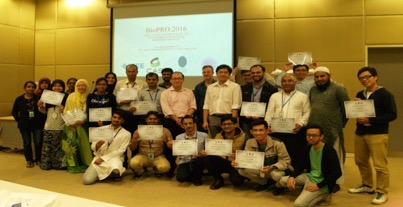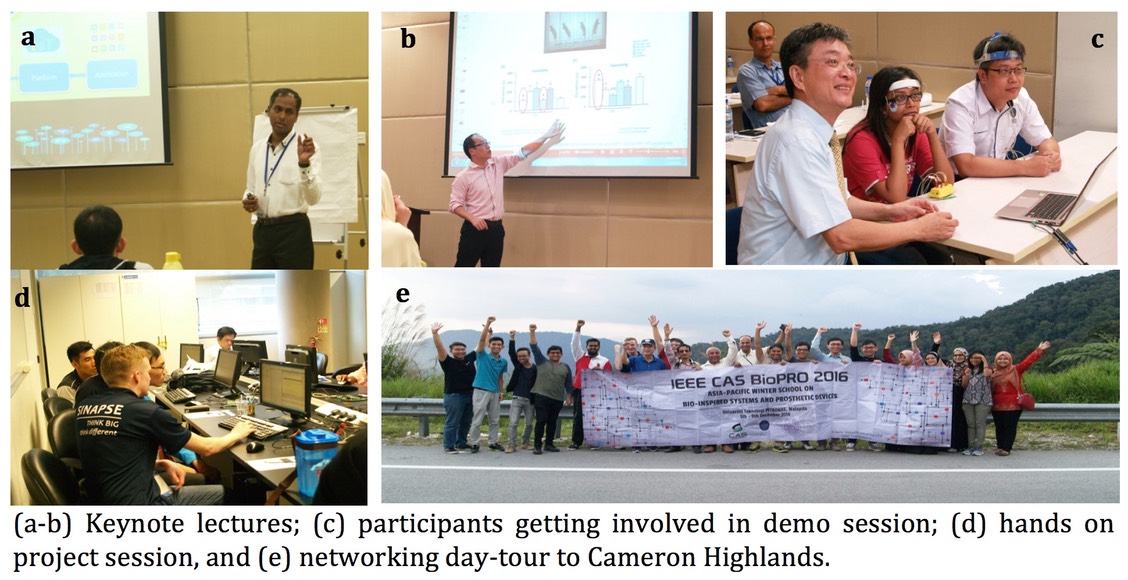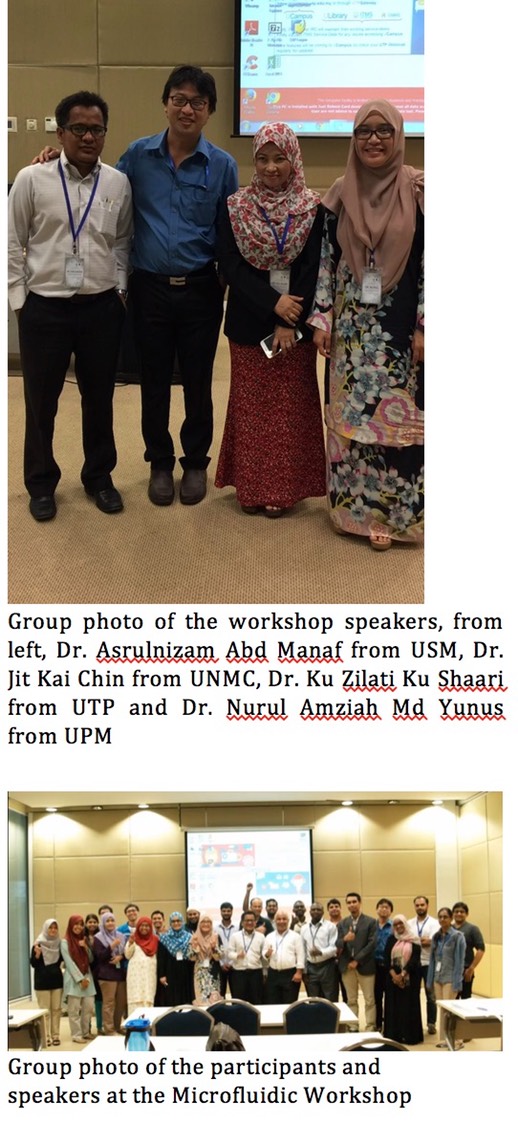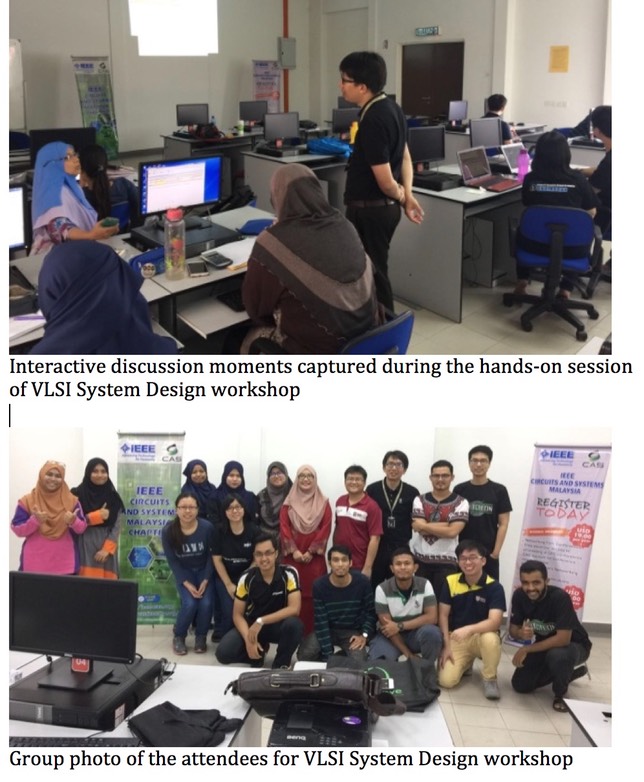IEEE CAS BioPro 2016: Asia-Pacific Winter School on Bio-inspired Systems and Prosthetic Devices in Seri Iskandar, Malaysia

Asia-Pacific Winter School on Bio-inspired Systems and Prosthetic Devices (BioPro) 2016 is considered as analogous to the annual cognitive neuromorphic workshops in Telluride for the US region and in Capo Caccia for the European region. The ultimate goal of the annual Asia-Pacific Seasonal School is promoting the applications of bio-inspired systems to real industrial or medical problems. BioPro has been held in Taiwan from 2009 to 2015, with the support from IEEE Circuits and Systems Society under Outreach Initiative. This year BioPro was organized by IEEE Circuits and Systems Society (Malaysia Chapter) as one of the IEEE Seasonal Schools in Circuits and Systems, in collaboration with Department of Electrical and Electronic Engineering, Universiti Teknologi PETRONAS (UTP) and National Tsing Hua University (NTHU). The hosts are Tong Boon Tang (UTP) and Hsin Chen (NTHU).
The winter school received a total of 52 registered participants comprising both local and foreign nationalities, e.g. Pakistan, Egypt, Taiwan, South Africa, Bangladesh, Yemen and Sudan etc (Fig.1). Besides the keynote lectures by eight invited speakers, we had a special session on microfluidic technology and applications with an additional six speakers from local universities to share their research projects and outcomes. The winter school further provided (a) a demo session of brain controlled game and robot, (b) a hands on project for practicing the knowledge from the lectures, and (c) a brainstorming day tour to Cameron Highlands on 7th December for all the participants to have a close interacts with speakers to discuss innovative ideas and future collaborations.

The winter school featured speakers from Singapore, Taiwan, Hong Kong and Malaysia. This organization is beneficial to promote regional collaboration among researchers. We had speakers from different disciplinary (engineering, computer science and medicine) and sectors (universities, hospitals, industry and research institute). The lectures on each day were designed to focus on one specific topic (Day 1: Big, Neural Data Computation; Day 2: Neurodegenerative Disorders and Diagnosis; Day 4: Microfluidic Technology; Day 5: Neuro-rehabilitation) to allow participants to learn background knowledge of interdisciplinary fields systematically. The learnt knowledge was helpful for participants to understand and participate in discussion actively, as well as to carry out hands on project. One of the highlights was the demo session led by Prof Jin-Chern Chiou of Industrial Technology Research Institute of Taiwan., where participants were introduced to a brain-controlled horse racing game and an eye-controlled ‘dragon’ robot.
The BioPro winter school offered a hands-on project, running 4:30 – 6:30 p.m. every day. The instructor was Dr Garrick Orchard of National University of Singapore. The goal of the project was to applying knowledge of bio-inspired systems to real industrial or medical problems. Adopting the concepts of neuromorphic engineering, the participants used the data captured by an asynchronous time-based image sensor array using silicon retinae cameras which mimic the biological eye. This project aims to help participants to translate learnt knowledge into their on-going projects e.g., unmanned vehicles, object tracking, velocity estimation. We had one representative of the participants to present the project to illustrate their understanding and appreciation about the project on Dec 9th. To extend this exciting and fruitful event, all invited speakers agreed that we should continue to run this winter school. The next stop BioPro 2017 will be in Singapore, and the BioPro 2018 in Australia.
More information can be accessed at IEEE CASS Malaysia chapter newsletter here.
Tang Tong Boon (email: tongboon.tang@petronas.com.my)

_________________________________
Microfluidic Workshop: Microfluidics Technology and Applications at BioPRo2016 in Seri Iskandar, Malaysia
Asia-Pacific Winter School on Bio-inspired Systems and Prosthetic Devices (BioPro) 2016 was hosted by Tong Boon Tang (UTP) and Hsin Chen (NTHU). The winter school received a total of 52 registered participants. It was held in one week from 5-9 December 2016. Besides the main eight keynote lectures by eight invited speakers, BioPro had a one day special session on December 8th 2016 entitled Microfluidic Workshop: Microfluidics Technology and Applications with six more invited speakers.
The workshop has been conducted successfully under the program chair, Dr. Nor Hisham Bin Hamid from Universiti Teknologi Petronas. Dr. Nor Hisham was also one of the speakers on that day. The other speakers are Dr. Jit-Kai Chin from the University of Nottingham, Malaysia, Dr. Asrulnizam bin Abd Manaf from Universiti Sains Malaysia, Dr. Ku Zilati Ku Shaari from Univesiti Teknologi Petronas, Dr. Mohd Ridzuan Ahmad from Universiti Teknologi Malaysia and Dr. Nurul Amziah Md Yunus from Universiti Putra Malaysia. The aim of the workshop was to have the university representatives to present Microfluidics Research Activities and Initiatives at their respective institutions.
Hence, it has been a success platform for students, researchers with interests and efforts in devices, circuits and systems of microfluidics to learn and align their research activities, identify potential areas for collaborations and discuss further development and technology transfer in this exciting area.
More information can be accessed at IEEE CASS Malaysia chapter newsletter here.
Nurul Amziah Md Yunus (email: amziah@upm.edu.my)
______________________________
VLSI System Design Workshop

On the 23rd and 30th November 2016, two days workshop on VLSI System Design was successfully conducted at University Putra Malaysia, Serdang, Selangor. The aim of this workshop was to share the knowledge and experience on designing VLSI system to the undergraduate students. Around 15 undergraduate senior year students attended the workshop.
A team of instructors – Fakhrul Zaman Rokhani and Lim Yang Wei from Universiti Putra Malaysia (UPM) covered the entire ASIC design methodologies, from system specifications to IC layout. In the first workshop session, technical lectures and industrial best practices in VLSI system design were shared. Challenges in designing multi-million gates system also been highlighted. In the second session of the workshop, students did hands-on in designing a compact digital system, exercising the complete ASIC methodology. This allows the students to have practical experience the designing digital VLSI systems.
More information can be accessed at IEEE CASS Malaysia chapter newsletter here.
Lim Yang Wei and Fakhrul Zaman Rokhani (email: fzr@upm.edu.my)